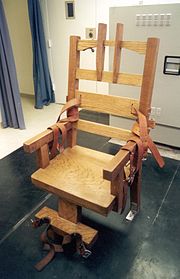
Back Elektriese stoel Afrikaans Ligetsetl ANG كرسي كهربائي Arabic Elektrik stulu Azerbaijani Електрически стол Bulgarian Cadira elèctrica Catalan Elektrické křeslo Czech Elektrisk stol Danish Elektrischer Stuhl German Ηλεκτρική καρέκλα Greek

The electric chair is a specialized device used for capital punishment through electrocution. The condemned is strapped to a custom wooden chair and electrocuted via electrodes attached to the head and leg. Alfred P. Southwick, a Buffalo, New York dentist, conceived this execution method in 1881. It was developed over the next decade as a more humane alternative to conventional executions, particularly hanging. First used in 1890, the electric chair became symbolic of this execution method.
Closely linked to capital punishment in the United States, the electric chair was also used extensively in the Philippines. Initially thought to cause death through cerebral damage, it was scientifically established in 1899 that death primarily results from ventricular fibrillation and cardiac arrest. Despite its historical significance in American capital punishment, electric chair use has declined with the adoption of lethal injection as a more humane method. While some states retain electrocution as a legal execution method, it's often a secondary option based on the condemned's preference. Exceptions include South Carolina, where it's the primary method, and Tennessee, where it can be used without prisoner input if lethal injection drugs are unavailable.
As of 2024, electrocution remains an option in states like Alabama and Florida, where inmates may choose lethal injection instead. Arkansas, Kentucky, and Tennessee offer the electric chair to those sentenced before a certain date. Inmates not selecting this method or convicted after the specified date face lethal injection. Arkansas currently has no death row inmates sentenced before their select date. These three states also authorize electrocution as an alternative if lethal injection is deemed unconstitutional.
The electric chair remains an accepted alternative in Louisiana, Mississippi, and Oklahoma if other execution methods are ruled unconstitutional at the time of execution. A significant shift occurred on February 8, 2008, when the Nebraska Supreme Court ruled electric chair execution as "cruel and unusual punishment" under the state constitution. This decision ended electric chair executions in Nebraska, the last state to rely solely on this method.